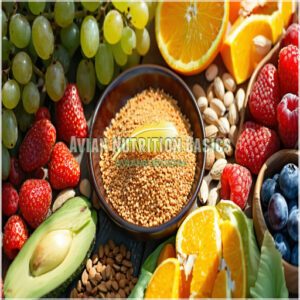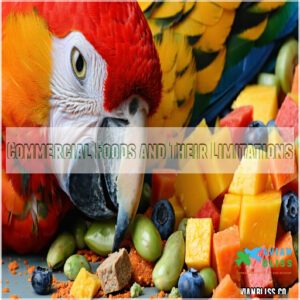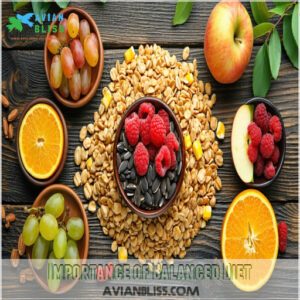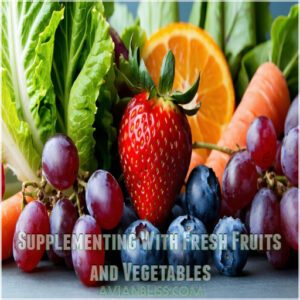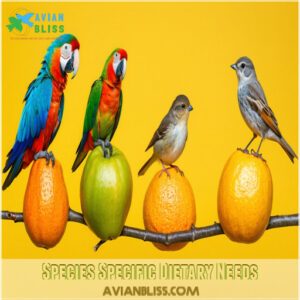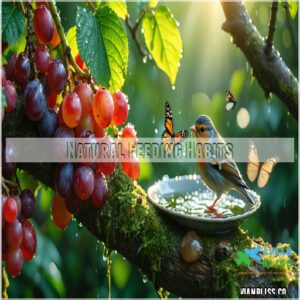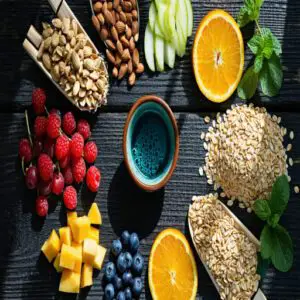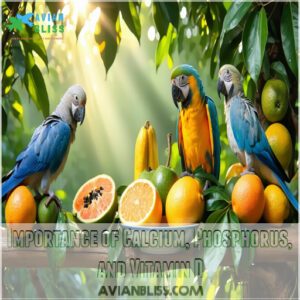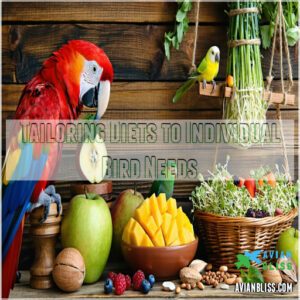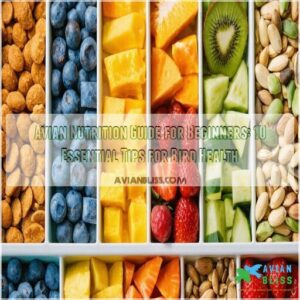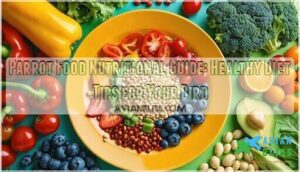This site is supported by our readers. We may earn a commission, at no cost to you, if you purchase through links.

Start with a foundation of fresh, organic fruits and vegetables, then add species-appropriate proteins and whole grains. Unlike commercial seeds or processed pellets, whole foods provide complete nutrition without artificial additives.
Your feathered friend needs different nutrients based on their species – parrots require more protein than finches, while waterfowl have seasonal dietary shifts.
Just like crafting the perfect recipe, creating your bird’s meal plan is both a science and an art. Understanding the right combinations reveals the secret to superior avian health, which is the key to a happy and healthy bird, and this can be achieved by following a well-planned avian diet plan.
Table Of Contents
- Key Takeaways
- Avian Nutrition Basics
- Choosing Bird Food
- Species Specific Dietary Needs
- Natural Feeding Habits
- Creating Balanced Diet Plans
- Frequently Asked Questions (FAQs)
- What is the best diet for birds?
- What is a balanced diet for chickens?
- Which of the following is not part of a healthy bird diet?
- What is a balanced diet for pigeons?
- How often should I change my birds water?
- Can birds eat foods cooked with olive oil?
- What foods are toxic to most birds?
- Should breeding birds receive different portions or foods?
- When is the best time to feed birds?
- Conclusion
Key Takeaways
- You’ll get better results from whole foods than commercial products – fresh fruits, vegetables, and species-appropriate proteins provide complete nutrition without artificial additives.
- Your bird’s nutritional needs vary by species and life stage – parrots need more protein than finches, while breeding birds require extra calcium for egg production.
- You need to mirror your bird’s natural foraging behaviors by creating opportunities to search for food throughout their living space, which keeps them physically active and mentally sharp.
- You should aim for a precise balance of nutrients – maintain a 2:1 calcium-to-phosphorus ratio, provide 12-30% protein for tissue repair, and ensure proper vitamin D levels for calcium absorption.
Avian Nutrition Basics
You’ll find that proper avian nutrition forms the foundation of your bird’s health, with whole, natural foods providing essential nutrients that packaged products simply can’t match.
Your feathered friend’s ideal diet should mirror their wild counterparts’ eating habits, focusing on a balanced mix of fresh fruits, vegetables, seeds, and species-appropriate proteins.
Role of Nutrition in Bird Health
In the field of avian wellness, proper nutrition serves as the cornerstone of your bird’s health.
A balanced bird food plan directly impacts their energy, feather quality, and immune system.
When you’re implementing effective feeding strategies, you’ll prevent bird malnutrition – a leading cause of illness.
Your avian nutrition choices influence everything from their mood to their lifespan, making ideal bird feeding essential for long-term health outcomes.
Importance of Whole Foods
Feeding your birds whole foods can make all the difference in their health and vitality.
When you provide nutrient-dense, natural ingredients, you’re giving them the building blocks for peak wellness.
Here’s why whole foods matter:
- Fresh fruits and vegetables deliver essential vitamins in their most bioavailable form
- Organic produce contains fewer pesticides and more nutrients
- Natural food combinations support proper digestion
- Whole grains provide sustained energy throughout the day
- Raw seeds and nuts offer healthy fats and proteins
The importance of whole foods lies in their ability to provide peak wellness and support proper digestion, making them a crucial part of a bird’s diet.
Avoiding Supplements and Packaged Foods
While whole foods provide complete nutrition, supplements and packaged foods often fall short.
You’ll find better results focusing on natural, fresh options for your feathered friends.
Here’s why certain commercial products mightn’t serve your birds well:
| Product Type | Common Issues | Better Alternatives |
|---|---|---|
| Supplements | Synthetic nutrients | Fresh vegetables |
| Packaged Seeds | Limited nutrition | Sprouted grains |
| Processed Pellets | Artificial additives | Organic whole foods |
| Commercial Mixes | Preservatives | Fresh fruit variety |
Your birds deserve nature’s best – not artificial substitutes, and providing them with fresh and organic options is crucial for their well-being.
Choosing Bird Food
You’ll need to rethink what you’re feeding your birds, as traditional commercial foods and seed-only diets often fall short of providing complete nutrition.
Your feathered friends require a balanced combination of whole foods, including fresh fruits and vegetables, to thrive and maintain peak health.
Commercial Foods and Their Limitations
Understanding proper avian nutrition starts with knowing what not to feed your birds.
Commercial bird food often falls short, containing fillers and by-products that can trigger allergies and weight issues.
Your feathered friends might struggle with malnutrition despite eating pre-made options, as these foods typically lack essential nutrients for healthy feather development.
Homemade chop recipes can offer better nutritional control, which provides better nutritional value.
Plus, you’ll spend more money on commercial foods while getting less nutritional value.
Importance of Balanced Diet
A balanced avian diet can make the difference between a thriving pet and one that just gets by.
Your bird’s nutritional needs go beyond what commercial foods can provide. A well-planned mix of proteins, fats, and carbohydrates supports optimum health, while proper nutrient balance prevents deficiencies.
Learn more about nutritious bird food for health.
Like building a perfect recipe, you’ll want to combine whole foods that complement each other for maximum benefit, creating a balanced avian diet that supports optimum health and prevents nutrient deficiencies.
Supplementing With Fresh Fruits and Vegetables
Your birds will thrive when you add fresh fruits and vegetables to their daily menu.
Consider best bird fruits vegetables for best nutrition.
Mix colorful produce like leafy greens, carrots, and berries to boost vitamin and mineral balance naturally.
Start with small portions of new fresh food options, introducing one at a time, to notice brighter feathers and more energy as these nutrient boosters complement their regular diet.
Species Specific Dietary Needs
You’ll need to adjust your bird’s diet based on its species, as parrots require higher protein levels than finches, while waterfowl need different fat and mineral ratios than raptors.
Your bird’s nutritional needs will also change throughout its life stages, so you’ll want to modify portions and nutrients to match its current age and activity level, ensuring you provide the right balance for its specific nutritional needs.
Parrot and Finch Nutrition Requirements
An extensive parrot and finch nutrition plan requires thousands of daily nutrients in precise ratios. Your feathered friends need specific amounts based on their species, size, and health status.
Seeds alone rarely provide sufficient nutrition, so prioritize balanced avian diets.
Here’s what you’ll need to focus on:
- Complete protein sources for tissue repair and feather development
- Essential vitamins A, D, and B-complex for growth and immunity
- Balanced minerals, especially calcium and phosphorus in a 2:1 ratio
- Fresh, organic ingredients over processed foods and supplements
Waterfowl and Raptors Dietary Needs
Many waterfowl thrive on carbohydrate-rich diets during winter, switching to protein-packed invertebrates during breeding season.
You’ll need to adjust their diet accordingly, focusing on grains and rice in colder months.
For raptors, provide whole meats, including organs and breast meat, customized to each bird’s health status.
Start with poultry and rodents, gradually introducing skinned meat as their condition improves, which can be a protein-packed approach.
Adaptation of Diets Based on Age and Life Stage
Every life stage in your bird’s journey requires specific nutritional adjustments.
Young chicks need protein-rich diets for rapid growth, while breeding birds require extra calcium for egg production.
You’ll want to modify senior diets with easier-to-digest nutrients and reduced fat content.
During molting, increase protein intake to support feather regeneration.
Juvenile birds thrive on specialized handrearing formulas that match their growth requirements.
Natural Feeding Habits
You’ll find that your pet birds naturally seek out a diverse mix of foods in specific patterns, just as their wild counterparts actively forage for fruits, seeds, and insects throughout the day.
Your domestic birds will thrive when you create feeding opportunities that mirror these natural behaviors, allowing them to search for and discover their food in different locations around their living space, which supports their instinct to actively forage and promotes a healthy environment by enabling them to thrive.
Foraging Behaviors and Natural Feeding
Understanding avian feeding habits starts with recognizing their natural foraging behaviors.
In the wild, your feathered friends don’t just eat from a bowl – they search, explore, and work for their meals.
This natural pattern of scatter feeding keeps them physically active and mentally sharp.
Food placement throughout their environment triggers their instincts, just as they’d experience searching for seeds, fruits, and insects outdoors, which is a part of their natural foraging behaviors and helps in keeping them physically active.
Mimicking Wild Foraging in Domestic Birds
Naturally, wild birds spend several hours each day foraging for food.
You can recreate this essential behavior by implementing scatter feeding and puzzle feeders throughout your bird’s living space.
Hidden treats in safe toys or specialized foraging enrichment devices encourage natural food-seeking behaviors.
Consider providing stimulating bird foraging toys to enhance these activities.
By mimicking wild bird diet patterns, you’ll support your pet’s mental wellbeing while maintaining species-appropriate dietary habits.
Providing Variety and Mental Stimulation
Food-puzzle enrichment transforms your bird’s mealtime into an engaging adventure. Understanding bird behavior feeding patterns is paramount for providing appropriate enrichment.
You’ll boost their mental stimulation and natural foraging behavior by rotating foods and using interactive feeders. Here’s how to create an enriching avian feeding environment.
- Hide treats in woven baskets or cardboard tubes
- Wrap food items in large, clean leaves
- Scatter dry foods across different platform levels
- Use puzzle feeders that require problem-solving skills to enhance their mental stimulation.
Creating Balanced Diet Plans
You’ll need to understand your bird’s specific nutritional needs, from protein requirements to essential vitamins, to create an effective feeding plan.
Your feathered friend’s ideal diet should include a precise balance of macronutrients and micronutrients, with careful attention to the vital calcium-to-phosphorus ratio of 2:1 for proper bone development, ensuring a well-rounded intake of nutrients for optimal health, including the importance of essential vitamins.
Macronutrient and Micronutrient Requirements
A balanced bird diet hinges on precise macronutrient and micronutrient ratios.
Your feathered friend needs 12-30% protein for tissue repair and feather growth, while fats should compose 2-20% of their diet for energy.
Complex carbohydrates fuel daily activities, and essential vitamins (A, D, E, B-complex) support organ function.
Water plays a key role in nutrient transport, while minerals maintain proper metabolic function.
Importance of Calcium, Phosphorus, and Vitamin D
Strong bones and healthy egg production depend on the right calcium phosphorus ratio, ideally 2:1.
This balance supports calcium absorption, preventing issues like metabolic bone disease.
Vitamin D synthesis, often from sunlight or food, maintains proper nutrient balance.
Without it, calcium can’t do its job.
Skip over-reliance on vitamin and mineral supplements—focus on whole foods for best vitamin balance.
Maintaining proper vitamin D levels is essential to prevent vitamin d toxicity issues in birds.
Tailoring Diets to Individual Bird Needs
Your bird’s dietary needs shift like seasons, requiring careful attention to species, age, and health status. Creating an individualized meal plan means considering your feathered friend’s activity level, size, and personal food preferences.
You’ll need to adjust portions and ingredients accordingly. A well-planned bird food diet is essential for their overall health.
- Watch how your cockatiel lights up when offered fresh sprouts
- Notice your macaw’s energy surge after a properly balanced breakfast
- See your finch’s feathers gleam with species-appropriate nutrition
A well-structured diet will have a significant impact on your bird’s overall wellness, and by following these guidelines, you can ensure your feathered friend receives the best possible care.
Frequently Asked Questions (FAQs)
What is the best diet for birds?
You’ll want to feed your feathered friends a mix of sprouted seeds, fresh produce, and natural proteins.
Skip commercial pellets – they’re nutritionally lacking.
Focus on whole foods that mimic their wild diet.
What is a balanced diet for chickens?
You’ll find your feathered friends thrive on a mix of layer feed with 16-18% protein, calcium supplements, fresh vegetables, and clean water. Add scratch grains sparingly for foraging enrichment.
Which of the following is not part of a healthy bird diet?
You’ll want to avoid feeding your feathered friends processed table foods like pizza, pasta, and chips.
These foods contain excessive salt and fat that aren’t part of a natural avian diet.
What is a balanced diet for pigeons?
Ravenous as wolves, your pigeons‘ll thrive on a mix of grains, seeds, and legumes. You should provide fresh greens weekly, plus grit for digestion. Don’t forget clean water daily.
How often should I change my birds water?
You’ll need to change your bird’s water twice daily, morning and evening, to prevent bacteria growth. For ideal health, clean the dish thoroughly each time and provide fresh, filtered water.
Can birds eat foods cooked with olive oil?
You can serve your birds foods cooked with small amounts of olive oil.
However, it’s best to limit oily foods since excessive fat intake isn’t healthy for them.
Steamed or raw options are preferable, as they are a healthier alternative.
What foods are toxic to most birds?
Like a minefield in your kitchen, you’ll want to avoid avocados, chocolate, caffeine, alcohol, onions, garlic, apple seeds, and salt. These common foods can wreak havoc on your bird’s health.
Should breeding birds receive different portions or foods?
Yes, you’ll want to adjust portions for breeding birds. They’ll need extra protein and calcium for egg production. Add sprouted seeds, cooked eggs, and cuttlebone to support successful breeding cycles.
When is the best time to feed birds?
Birds follow nature’s clock.
You’ll want to feed your birds in early morning and late afternoon when they’re most active.
Like wild foraging patterns, this timing matches their natural energy peaks and eating habits.
Conclusion
While creating balanced avian diet plans may seem challenging at first, you’ll find it’s worth the effort when you see your bird thriving.
Remember that each species has unique nutritional needs, so take time to understand your feathered friend’s natural feeding patterns.
You’re not just providing sustenance – you’re investing in their long-term health and happiness. By following the guidelines we’ve shared, you’ll be well-equipped to give your bird the nutrition they deserve.
- https://www.cheekybeaks.org.za/2020/05/04/balanced-diet
- https://www.dvm360.com/view/practical-avian-nutrition-proceedings
- https://www.avianenrichment.com/learn/physical-needs/diet-nutrition
- https://www.bestbirdfoodever.com/2021/06/about-my-balanced-exotic-avian-maintenance-diet-food-plan/
- https://bestfriends.org/pet-care-resources/best-parrot-diet-and-toxic-foods-avoid

